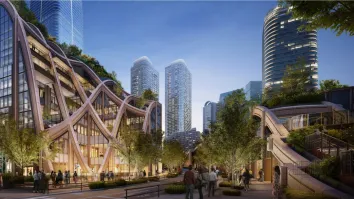
1 in 2 APAC property investors prioritise green buildings when buying assets
And 72% of investors believe green certifications drive higher occupancy, rents, and tenant retention.
JLL conducted a research study with 550+ corporate real estate leaders in Asia Pacific (478 occupiers and 76 investors) to get a better understanding of how organisations are translating their sustainability ambitions into actions while leveraging real estate to do so.
To implement ambitious decarbonisation goals, JLL says corporates will need a multi-pronged action strategy at the enterprise level. One of the best opportunities to tackle carbon emissions lies in their real estate, whether it is owned or leased. Recognition of this fact is clear given that 90% of occupiers agree that real estate is a game changer in achieving the net zero carbon agenda. Furthermore, for 61% of occupiers’ carbon emissions reduction is specifically part of their real estate strategy; 94% for the Leading occupier set.
Here’s more from JLL:
A majority of occupiers (80%) agree that they will proactively prioritise locations that help them reduce carbon emissions in the future and investors (65%) agree that they would prioritise investing in cities that are climate change progressive. Occupiers also aspire to have market recognised sustainability certification for at least half of their portfolio by 2025 and 7 in 10 are also willing to pay a rental premium to lease sustainability certified buildings in the future.
Among those who currently lease space in a green building, majority of them are paying a rental premium of 7-10%. This validates the belief held by 72% of investors that green certifications drive higher occupancy, higher rents, higher tenant retention and overall higher value for the asset. As a result when building or buying assets, 1 in 2 investors prioritise buildings with green certification. We also found that overall LEED certification is most sought after in Asia Pacific, followed by country specific certifications such as BCA Greenmark for Singapore and NABERS for Australia.
When probed on specific decarbonisation initiatives implemented across their portfolio, occupiers agree that due to the relative ease of implementation, water and energy initiatives have the highest adoption rate. 70% of the organisations undertaking sustainability initiatives are reducing water consumption, incrementally reusing and recycling water and finding ways to reduce energy use (smart heating, smart lighting, etc.).
Renewable energy adoption also features high on the list of actions, as it will be impossible to get to a net zero position without the use of renewables. Both onsite and offsite solutions are being considered as real estate professionals realise the benefits of renewable energy, in terms of the cost savings for landlords and occupiers and enhanced value for investors. Leading occupiers are a step ahead of the rest; 6 in 10 have adopted RE100 (100% renewable energy) and EP100 (improved energy productivity) as part of their decarbonisation strategy. They are also following other sophisticated strategies to stay on course to achieve their ambitious carbon emission goals.
Bigger ambitions bring bigger challenges. We found that the lack of funding and lack of support from landlords are primary barriers highlighted by occupiers when implementing a decarbonisation strategy. When we asked the same question, real estate investors identify aging building infrastructure and systems as their top challenge. With new and upcoming building stock more aligned to the green agenda and regulatory requirements, it is no surprise that investors display their concern about the aging buildings and stock that needs to be brought into the green fold if ambitious net zero targets are to be achieved. Retrofitting buildings is a clear opportunity and a sizable challenge as green strategies drive higher returns on investment and value.
The current supply of net zero buildings is not sufficient to meet the ambitious targets set by occupiers and investors unless further developments come on-stream quickly. Demand risks outstripping supply unless a long tail of investments is unlocked. Investors are on-board with this idea, as evidence from our survey shows that asset refurbishment and renovation is going to be the largest area of investment for investors in the next three years, followed by digital solutions, renewables and carbon offsets.
Download the full report here.


















 Advertise
Advertise


